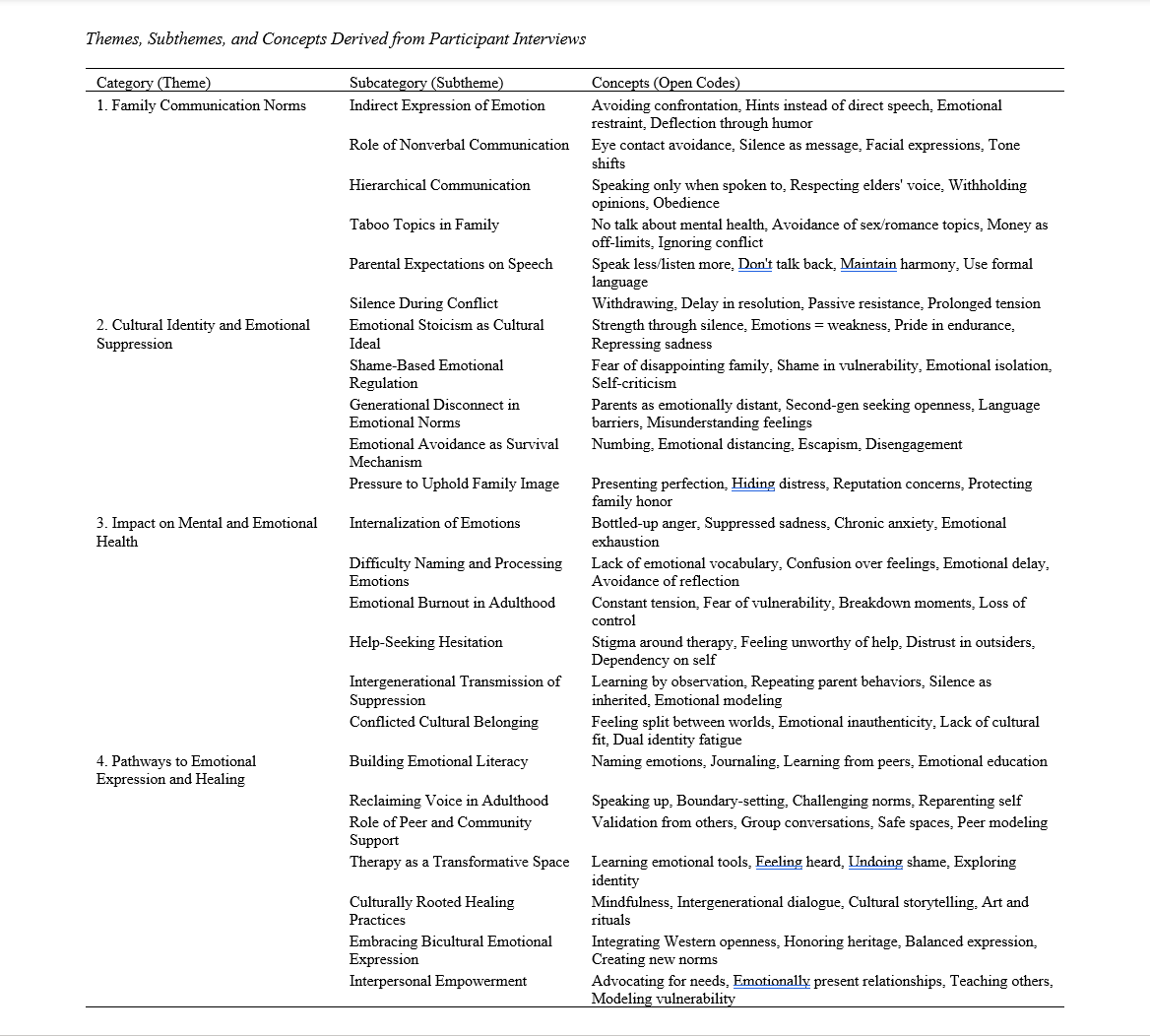Cultural Silence and Emotional Suppression in Asian-American Families: A Phenomenological Exploration
Keywords:
Asian-American families, emotional suppression, cultural silence, intergenerational communication, phenomenological research, bicultural identity, mental healthAbstract
Objective: This study aimed to explore the lived experiences of cultural silence and emotional suppression within Asian-American families.
Methods: This qualitative study utilized a phenomenological approach to investigate emotional suppression among 24 Asian-American adults residing in the United States. Participants were selected through purposive sampling to ensure diversity across ethnic subgroups and generational backgrounds. Data were collected through semi-structured, in-depth interviews conducted via secure video conferencing platforms. Interviews lasted between 60 and 90 minutes and continued until theoretical saturation was reached. All interviews were audio-recorded, transcribed verbatim, and analyzed thematically using NVivo software. Thematic analysis was performed through an inductive coding process that emphasized participants’ subjective interpretations and cultural meaning-making around emotional expression.
Findings: Four major themes emerged from the data: family communication norms, cultural identity and emotional suppression, impacts on mental and emotional health, and pathways to emotional expression and healing. Participants reported indirect communication, emotional stoicism, and intergenerational silence as common patterns within their families. These dynamics were often reinforced by cultural expectations of respect, shame, and self-control. Emotional suppression was linked to internalized distress, difficulty in emotional identification, and barriers to help-seeking. Despite these challenges, participants also described transformative experiences involving therapy, peer support, and bicultural integration that facilitated emotional literacy and relational healing.
Conclusion: Emotional suppression and cultural silence in Asian-American families are shaped by deep-rooted cultural values and intergenerational practices. While these patterns may hinder emotional well-being, participants also demonstrated adaptive strategies and agency in redefining emotional norms. These findings underscore the importance of culturally responsive mental health practices that validate heritage while promoting emotional authenticity.
Downloads
References
Ang, J. Y., & Tsai, W. (2023). Cultural Differences in the Relations Between Expressive Flexibility and Life Satisfaction Over Time. Frontiers in psychology, 14. https://doi.org/10.3389/fpsyg.2023.1204256
Bebko, G., Cheon, B. K., Ochsner, K. N., & Chiao, J. Y. (2019). Cultural Differences in Perceptual Strategies Underlying Emotion Regulation. Journal of Cross-Cultural Psychology, 50(9), 1014-1026. https://doi.org/10.1177/0022022119876102
Chiang, S., Chin, C. A., Meyer, E. W., Sust, S., & Chu, J. P. (2022). Asian American Adolescent Help-Seeking Pathways for Psychological Distress. Asian American Journal of Psychology, 13(2), 194-206. https://doi.org/10.1037/aap0000241
Dong, X., Li, M., & Guo, M. (2019). Cultural and Social Resilience Factors on Health in the Context of Immigration. Innovation in Aging, 3(Supplement_1), S30-S30. https://doi.org/10.1093/geroni/igz038.116
Gee, C. B., Khera, G. S., Poblete, A. T., Kim, B., & Buchwach, S. Y. (2020). Barriers to Mental Health Service Use in Asian American and European American College Students. Asian American Journal of Psychology, 11(2), 98-107. https://doi.org/10.1037/aap0000178
Huang, C. J., & Huang, C. Y. (2024). The Moderating Role of Emotion Regulation Strategies on Asian American Parents’ Discrimination Experiences and Mental Health During the COVID-19 Pandemic. American Journal of Orthopsychiatry, 94(2), 190-201. https://doi.org/10.1037/ort0000714
Huang, K. Y., Calzada, E. J., Cheng, S., Barajas‐Gonzalez, R. G., & Brotman, L. M. (2016). Cultural Adaptation, Parenting and Child Mental Health Among English Speaking Asian American Immigrant Families. Child Psychiatry & Human Development, 48(4), 572-583. https://doi.org/10.1007/s10578-016-0683-y
Huang, M. (2024). The Effect of Cultural Factors on Asian American Healthcare Decision-Making. https://doi.org/10.31219/osf.io/6e7wp
Kim, H., & Sasaki, J. Y. (2024). Toward an Explanation of Cultural Differences in Subjective Well-Being: The Role of Positive Emotion Norms and Positive Illusions. Frontiers in psychology, 15. https://doi.org/10.3389/fpsyg.2024.1356172
Lei, N., & Pellitteri, J. (2017). Help-Seeking and Coping Behaviors Among Asian Americans: The Roles of Asian Values, Emotional Intelligence, and Optimism. Asian American Journal of Psychology, 8(3), 224-234. https://doi.org/10.1037/aap0000086
Leong, F. T. L., Chopik, W. J., Somaraju, A., & Kuang, S. (2023). Antecedents of Rowe and Kahn’s Successful Aging Model for Asian Americans. Asian American Journal of Psychology, 14(2), 209-217. https://doi.org/10.1037/aap0000292
Lin, K. (2016). Mental Health Initiatives for Asian American Women. Buuj, 2(1). https://doi.org/10.22191/buuj/2/1/5
Rakhmaniar, A. (2023). Peran Emosi Dalam Komunikasi Antarbudaya. Harmoni Jurnal Ilmu Komunikasi Dan Sosial, 1(2), 281-297. https://doi.org/10.59581/harmoni-widyakarya.v1i2.3720
Senft, N., Doucerain, M. M., Campos, B., Shiota, M. N., & Chentsova-Dutton, Y. (2023). Within- And Between-Group Heterogeneity in Cultural Models of Emotion Among People of European, Asian, and Latino Heritage in the United States. Emotion, 23(1), 1-14. https://doi.org/10.1037/emo0001052
Shahid, M., Weiss, N. H., Stoner, G. D., & Dewsbury, B. (2021). Asian Americans’ Mental Health Help-Seeking Attitudes: The Relative and Unique Roles of Cultural Values and Ethnic Identity. Asian American Journal of Psychology, 12(2), 138-146. https://doi.org/10.1037/aap0000230
Sharif, H. S., Miah, S. K., Ramanathan, A., Glover, N., & Shaikh, M. (2022). Expression of Emotion in the British South Asian Diaspora: A Qualitative Study. https://doi.org/10.1101/2022.12.21.22283824
Suh, H. N., Goergen, J., Nelson, B., & Flores, L. Y. (2020). Acculturative Strategies and Mental Distress Among Asian American College Students: The Role of Asian Values Across Acculturative Strategies. Asian American Journal of Psychology, 11(4), 269-279. https://doi.org/10.1037/aap0000216
Sun, M., & Lau, A. S. (2018). Exploring Cultural Differences in Expressive Suppression and Emotion Recognition. Journal of Cross-Cultural Psychology, 49(4), 664-672. https://doi.org/10.1177/0022022118763749
Thomas, E., & Haddad, J. (2022). Help-Seeking Attitudes and Behaviors in Asian American College Students. https://doi.org/10.31219/osf.io/tdya9
Wang, J., Leong, I. t., Johnson, M. K., Pei, Y., Lee, K. H., Mittelman, M., Epstein, C. F., Cho, S., & Wu, B. (2024). What Matters to Chinese and Korean American Dementia Caregivers: Navigating Cultural Influences in Dementia Care From Caregivers’ Perspectives. Journal of Alzheimer S Disease, 98(2), 519-538. https://doi.org/10.3233/jad-231140
Yoo, J., & Miyamoto, Y. (2018). Culture, Emotion, and Health. 366-378. https://doi.org/10.1093/oxfordhb/9780190676384.013.23
Zhang, J. B. (2024). The Hidden Social Variables Influencing Asian Americans Socioemotional Wellbeing and Mental Health (Preprint). https://doi.org/10.2196/preprints.67734
Zhu, Y., Martin, A. N., Kane, H. S., & Park, J. (2023). Is Daily Emotion Suppression Associated With Poor Sleep? The Moderating Role of Culture. Emotion, 23(7), 1829-1843. https://doi.org/10.1037/emo0001206

Downloads
Additional Files
Published
Submitted
Revised
Accepted
Issue
Section
License

This work is licensed under a Creative Commons Attribution-NonCommercial 4.0 International License.




















